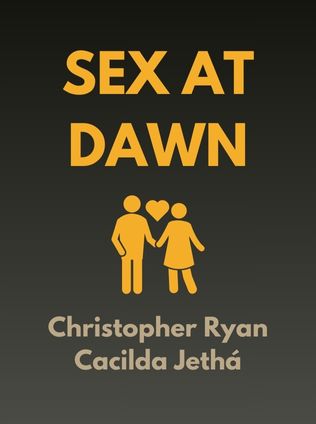
Sex at Dawn
The Prehistoric Origins of Modern Sexuality
By Christopher Ryan and Cacilda Jethá
Published 06/2010
About the Authors
"Sex at Dawn" is the collaborative work of Christopher Ryan and Cacilda Jethá, a dynamic duo that brings together a rich blend of psychology, anthropology, and evolutionary science. Christopher Ryan, a psychologist with a Ph.D. focusing on the prehistoric roots of human sexuality, has spent much of his career questioning widely accepted beliefs about human nature. His curiosity and critical thinking led him to explore the complexities of human sexuality, challenging the conventional wisdom that has long shaped our understanding of monogamy and sexual behavior.
Cacilda Jethá, a psychiatrist with extensive experience working with various cultures around the world, adds a crucial dimension to this exploration. Her medical background and understanding of human behavior in diverse social contexts provide a grounding influence on the book's arguments. Together, Ryan and Jethá create a compelling narrative that is both scientifically informed and culturally sensitive, aiming to unravel the mysteries of our sexual past and its implications for our present and future relationships.
Main Idea
The central thesis of "Sex at Dawn" is both provocative and enlightening: the belief that monogamy is the natural state for humans is a misconception rooted in cultural narratives rather than biological imperatives. Ryan and Jethá argue that for most of human history, our ancestors lived in egalitarian, hunter-gatherer societies where sexual relationships were far more fluid and non-exclusive than they are today. They contend that it was only with the advent of agriculture and the subsequent rise of property ownership that strict monogamy became a social norm, enforced through cultural institutions and reinforced by religious doctrine.
The authors delve into a wide array of evidence to support their claims, drawing from primatology, anthropology, and biology. They explore the sexual behaviors of our closest primate relatives, the social structures of contemporary foraging societies, and the physiological traits of modern humans to paint a picture of a more promiscuous and cooperative past. By challenging the "standard narrative" of human sexuality, Ryan and Jethá open the door to rethinking our modern approach to relationships, love, and commitment.
Table of Contents
- Introduction: The Question of Monogamy
- The Standard Narrative: What We Think We Know
- Flaws in the Standard Narrative
- Great Apes and Human Evolution
- Lessons from Foraging Societies
- Human Biology: What Our Bodies Tell Us
- The New Narrative: Rethinking Human Sexuality
- Implications for Modern Relationships
- Conclusion: Embracing Our Sexual Nature
Introduction: The Question of Monogamy
From the moment humans became conscious beings capable of forming complex societies, the question of how we organize our sexual relationships has been central to our cultural evolution. The predominant belief in many modern societies is that monogamy is not only the ideal but also the natural state for human beings. This belief is so deeply ingrained that it influences laws, religious practices, and social norms, making any deviation from monogamy appear aberrant or immoral.
But what if this belief is not as ancient or as biologically rooted as we think? Ryan and Jethá begin their exploration by questioning the very foundation of our understanding of human sexuality. They challenge the reader to consider whether monogamy is a cultural invention rather than a biological imperative, a social construct that arose out of specific historical circumstances rather than an inherent aspect of human nature.
The Standard Narrative: What We Think We Know
The "standard narrative" of human sexuality, as described by Ryan and Jethá, is a set of widely accepted beliefs about the evolutionary origins of our mating behaviors. According to this narrative, men and women have evolved distinct reproductive strategies due to their differing biological roles in procreation. Men, driven by a desire to spread their genes as widely as possible, are naturally inclined toward promiscuity. Women, on the other hand, are thought to be more selective, seeking a stable partner who can provide resources and protection for her and her offspring.
This narrative suggests that monogamy is a natural outcome of these differing strategies: women secure a mate who can provide resources, and men gain the assurance of paternity, thus ensuring their genes are passed on. In this view, monogamy is portrayed as a practical arrangement that benefits both sexes and, by extension, the survival of the species.
However, Ryan and Jethá argue that this narrative is heavily influenced by contemporary social values and does not accurately reflect the realities of our prehistoric ancestors. They describe this tendency to project modern values onto the past as "Flinstonization," a term they use to critique the anachronistic assumptions that underpin much of our understanding of human evolution.
Sign up for FREE and get access to 1,400+ books summaries.
You May Also Like
The Subtle Art of Not Giving a F*ck
A Counterintuitive Approach to Living a Good Life
By Mark MansonHow To Win Friends and Influence People
The All-Time Classic Manual Of People Skills
By Dale CarnegieFreakonomics
A Rogue Economist Explores the Hidden Side of Everything
By Steven D. Levitt and Stephen J. DubnerQuiet: The Power of Introverts
The Power of Introverts in a World That Can't Stop Talking
By Susan Cain



















